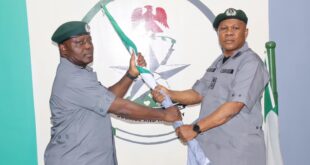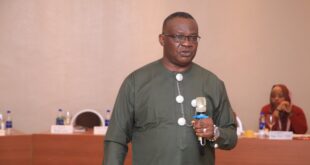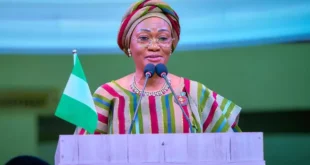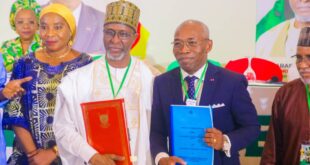Senator Ovie Omo-Agege, former Secretary to the State Government, Delta state is the Senator representing Delta Central Senatorial District of Delta State. In this interview, he maintained that the economic situation in the country would have been worse than it is today had PDP remained in power. He says President Muhammadu Buhari has done well in stabilising the country. He condemned the activities of the Niger Delta Avengers and urged the government to do more to lift the people of the Niger Delta out of poverty by adopting a framework that will ensure a sustainable and mutually beneficial relationship between the government, the international and indigenous oil companies and the communities, Ovasa Ogaga presents the excerpts:
What is your assessment of President Muhamadu Buhari performance in office?
President Muhamadu Buhari was elected to change the course of a nation that was drifting in the wrong path. Terrorists were moving freely within Nigeria and across borders, claiming territories, causing mayhem and killing people. The economy was deeply damaged by corruption and the biggest collapse in crude oil prices and revenue.
To deal with the security situation, government had to relocate the military command and control centre to Maiduguri, build international coalitions and equip the military. We have reclaimed most of the territories Boko Haram occupied, including the sambisa forest, they are now unable to move freely and threaten us, some of the chibok girls have been rescued, International Displaced Persons are returning home, the borders and cities are no longer easily accessible to terrorists. The truth is that we have succeeded in degrading and decimating Boko Haram in a way we thought impossible and today we are significantly safer than we were 15 months ago. I give the President a lot of credit for the strategic decisions made to get us to this position of relative security. Keeping our nation safe and defending its sovereignty is the most important duty of a president. And on this, President Muhamadu Buhari has delivered.
In the area of corruption, it is very clear that the government has done very well. Never in the history of Nigeria, has any government achieved what this government has done. Before now, corruption was a way life. It’s hard to imagine how our country was ripped off. People were just sharing our money. But all that is changing. Huge amounts have been recovered and counting.
The economy has been more challenging to the government. As I said earlier, the government inherited a deeply damaged economy that was on a free fall. The 2016 budget was designed to stabilise the economy and lay a strong foundation for a diversified economy that will create jobs for those who want to work and opportunities for those who want to set up businesses. The removal of fuel subsidy and the introduction of flexible exchange rate are policies that will help to stabilize the economy, so we can begin the long road to recovery. Increased infrastructural spending in the budget will help to diversify the economy. Overall the government has done well in moving the country in the right direction.
Sir, you appear to be overly optimistic about the economy. Many Nigerians are not. They are blaming President Buhari for the bad shape of the economy. Some are already expressing buyer’s remorse, saying that this was not the change they voted for. Are you not unduly praising the government?
I can tell you that most of those blaming the President for the hardship in the land today did not vote for him in the first place, so they cannot be expressing any buyer’s remorse.
Having said that, I want to say that I understand that times are tough; food prices have shot up, people are hurting, frustrated and angry over the economy. But the truth must be told. The President inherited a mess and he is just cleaning up the mess. The hardship we face today as a nation and individual was not created by this government. The poor state of the economy is a direct result of the mismanagement and mediocre performance of the past government. When earnings from crude oil exports were high, the government did not save for the rainy day and did not invest in infrastructure. Now the country is broke. No electricity, no good roads, no good school and quality hospitals. The country is in total mess which has been building for years. No one took steps to diversify the economy while we were earning so much. It is impossible for anyone to repair the damage done to the economy in just one year. Those who expected a quick fix should have a rethink because there is none. It’s going to be a gradual painful process.
Nigerians need to be patient. If we persevere and remain steadfast, together we will lead our country to peace and prosperity because the President has adopted an approach that embodies the values and direction that Nigeria has to take to achieve greatness. I don’t know what those who are expressing buyer’s remorse want. Do they want us to continue the same old policies that got us here in the first place? Or do they honestly think that the same people who destroyed the economy would have fixed it? I seriously don’t think so. I have no doubt that the looting would have continued and the economic situation would have been worse than it is today.
As a Niger Deltan, what is your take on the activities of the Niger Delta Avengers?
I am a little curious about the timing of the emergence of the Niger Delta Avengers. Why now? The Federal Government Amnesty Program of 2009 was supposed to end the hostilities and it did. And when Dr. Goodluck Jonathan, a Niger Deltan, became President in 2010, many applauded the feat as the icing on the cake of the Niger Delta struggle. So what has changed? What has this government done to warrant this senseless destruction of our national assets? This nonsense must stop. There is no justification for it at all.
Armed struggle in the Niger Delta began with the Niger Delta Volunteer Force which was formed by Isaac Boro, Sam Owonaru and Nottingham Dick to liberate the Ijaw people from economic exploitation and political oppression. Other prominent Niger-Deltans such as Ken Saro Wiwa adopted non violent means to continue the struggle. There was the 1998 Kaima Declaration in the home town of Isaac Boro. The struggle was all about the marginalization, oppression and exploitation of the Niger Delta people and the degradation of the environment. That struggle led to the 13% derivation fund, the establishment of the Niger Delta Development Commission (NDDC) as an interventionist agency to develop the region and the Federal Ministry of Niger Delta.
Urhobo people played very significant roles in the Niger Delta struggle. Professors Peter Ekeh, Bright Ekuehare, G. G. Darah gave credibility to the struggle through their scholarly efforts. Urhobo youths also died in the course of the armed struggle. But this struggle being waged by the Niger Delta Avengers is not the struggle we the Urhobo people believe in. This is not the Niger Delta struggle which Ken Saro Wiwa lived and died for. These renewed attacks on oil facilities are unwarranted.
Nigeria is passing through a most difficult period and we must all support the the President who is trying to salvage the country. I have no doubt that President Buhari means well for Niger Delta. He has started the clean-up of the Ogoni land which the immediate past government failed to do. He has made provision in this year’s budget for the construction of the Lagos-Calabar railway which will transform the Niger Delta. If truly the Niger Delta Avengers are fighting for the people of the region, they should embrace dialogue. We are in a democracy and there is no need for violence. When a group decides it no longer wants to debate and discuss its ideas and dialogue with government on their grievances, but rather wants to blow up oil facilities of the country that further destroys the environment, that is terrorism and it cannot and must not be tolerated by the government.
Sir, one of the demands of the militants is that the Federal Government drop charges against former militant leaders and Niger Delta politicians accused of corruption. It was even reported sometime ago that the governors of the states of Niger Delta made the same demand when they met with Vice President Yemi Osibanjo. What is your opinion on this?
Dropping charges against those accused of corruption as a precondition for ending the militancy is a non starter as far as I am concerned. It’s awful that our governors would table such a request before the Vice President. If it’s true, then it is extremely difficult not to believe that it is a plot to abort the anti-corruption war of President Buhari. It’s shameful and disrespectful to the people of the Niger Delta, including those who have lost their lives in the struggle. It’s a terrible thing to do. It’s selfish and it introduces politics into the struggle and that worries me greatly. We cannot let them undermine the fight against corruption. If we do, the great promise of Nigeria will die. The anarchists and those who don’t wish Nigeria well would have won. We must stand firm against the evil minds in our midst.
As Chief Executive Officers of their states, governors should take the lead in tackling the problem. It appears they know those who are behind these bombings. And if they do, they should stand up and stop it. It’s not enough for them to act as intermediaries. They should deal with it. Otherwise, it will be assumed that they are supporting the militants. The Federal government must not give in to this blackmail. It is unacceptable for any group of people, no matter their grievances, to hold the state to ransom for selfish reasons.
How should the Federal Government handle the Niger Delta crisis?
Militant attacks on oil facilities are threats to the nation’s survival. It’s an economic war that poses serious threat to the economic growth, development and stability of the country. We must take it very seriously. However, this crisis can be resolved more through negotiation than by military action if all parties act in good faith. It appears both parties are ready to dialogue. But while government focuses on non-military means, all options should be on the table. We should not rule out military action, especially now that the motive of the Niger Delta Avengers is not very clear. Is this a genuine struggle for the people of the Niger Delta without a hidden agenda? The timing of hostilities makes me to doubt. But if it is and their motive is to solve the problems of poverty and environmental degradation in the Niger Delta, then we can end the crises without resort to military action. In which case, a good faith negotiation by all parties and informed participation of the leaders of the Niger Delta will produce a workable road map out of the crisis. But if the motive is to stop the war against corruption, then we are in a different territory all together. This nation cannot be a hostage of terror.
Why has previous efforts made to resolve the Niger Delta crisis failed to stop the agitation?
If Nigeria is prospering, Niger Delta which produces about 80 percent of the wealth must have a fair share of that progress. But we are not. The 13 percent allocation to the oil producing state is inadequate especially when you consider that in the 1963 constitution, states got 50% of revenue from mineral resources. In effect, what I am saying is that the previous efforts have been grossly inadequate.
Also the approach we adopted was wrong. Everything was centralized and the top –down interventionist programs of the Niger Delta Development Commission and the Ministry of Niger Delta Affairs were rendered ineffective by the elites who hijacked the benefits. The Amnesty program failed because it was designed as a palliative measure to appease former militants. Appeasement always fails because it encourages re occurrence. You cannot remedy a problem without tackling the root causes of the conflict. So, in going forward, what is germane is to address the fundamental grievances of the Niger Delta people. And what are these grievances?
Decades of oil and gas exploration has messed up our environment and left us with poverty. We have been carrying this burden alone. Now the people of the Niger Delta want the Federal government to return more of the revenue generated from oil sales, develop the region, end gas flaring, oil spills and clean-up the damage that have been done to the environment. These are legitimate demands.
And let me make it very clear that the grievances of the Niger Delta people do not include ending the corruption war of the government. To the contrary, the people of the Niger Delta want the anti-corruption war to be extended to the Niger Delta states. The people want the state governments in Niger Delta to account for the 13 percent derivation that has been appropriated to the region. Asking the federal government to drop charges against those accused of corruption is antithesis to our values.
Niger Delta must be developed and the people lifted out of poverty. This is the only way out of this conundrum. We can end this crisis. The government can meet these demands. We must do this to isolate the criminals who have hijacked the struggle. But to do so, we have to think Nigeria first and stop looking at the issues through the prism of ethnicity, regionalism, and north versus south, which have prevented us from addressing the germane concerns of the people of Niger Delta. Until a way is found for the people to benefit directly from the oil in their community and their lives made better, there will always be agitation and armed struggle. To achieve this we must adopt a bottom – up approach that focuses on the people and communities.
All that said, a deal must consist of a framework that will ensure a sustainable and mutually beneficial relationship between the government, the international and indigenous oil companies and the communities.
So what are the pre-requisites for enduring peace in Niger Delta?
First, and above all, we need to pass the Petroleum Industry Bill (PIB) speedily. A PIB that include the Host Community Fund will douse the tension and put the communities at the heart of resolution of this crisis. They will be responsible for the security of the assets of the oil industry. The PIB also seek to deregulate and liberalise the downstream sector of the industry, which when fully implemented will transform the Niger Delta. So government should make the removal of subsidies on petroleum products permanent and move quickly to privatise the refineries. Functioning refineries will create wealth and jobs for the people.
Second, we need to enforce extant environmental laws on gas flaring, oil spills and environmental degradation and compel the oil companies to obey them. Last year alone, Shell and Eni admitted that over 550 oil spills occurred in the Niger Delta. This cannot happen in the host countries of the international oil companies. They dare not because they know the consequences. On average, only 10 spills occurred every year across Europe between 1971 and 2011. We cannot let the IOCs mess up our environment and the lives of our people, while we look the other way. Government must rise up to its responsibilities. Its time government stood up to the IOCs and insist on full compliance with global standards and best practices. This is the only way we can stop further damage to the environment.
Third, we need to clean up the entire Niger Delta and restore the aquatic life of the creeks, swamp, fishing grounds and farmlands. While we appreciate the One billion dollars clean-up plan for Ogoniland, it is essential that other areas which have suffered similar shocking levels of pollution are cleaned-up as well.
Fourth, we need to refocus all existing interventionist programs. NDDC should get out of the business of competing with local governments in the provision of bore holes and focus on massive public works for infrastructural development that will transform oil producing communities.
Fifth, we need to tackle corruption in the Niger Delta. Though not enough resources have been transferred to Niger Delta, we have cause to believe that a lot of that money has gone into private pockets. A lot more development should have occurred, but progress has been stifled by corruption. This needs to be addressed, as part of the framework to solve the problem.
Lastly, the government should reinstate the Nigerian Maritime University, Okerenkoko. The scapping of this University is the only grievance you can pin on this government. Though I appreciate the reasons given by the Minister of Transport, Hon. Rotimi Amechi for the closure, I think the government should reconsider its position and reinstate the university. The University is very important to the people and the community of Okerenkoko and indeed the entire Niger Delta people. It has become a symbol of the renewed militancy. Reopening the university will douse tension in the region considerably.
Subscribe to the Advocate News letter and receive news updates daily in your inbox.
 Advocate.ng Latest news update on politics, entertainment, sport and more
Advocate.ng Latest news update on politics, entertainment, sport and more



